 W
WYoshisuke Aikawa was a Japanese entrepreneur, businessman, and politician, noteworthy as the founder and first president of the Nissan zaibatsu (1931–1945), one of Japan's most powerful business conglomerates around the time of the Second World War.
 W
WMasahiko Amakasu was an officer in the Imperial Japanese Army imprisoned for his involvement in the Amakasu Incident, the extrajudicial execution of anarchists after the 1923 Great Kantō earthquake, who later became head of the Manchukuo Film Association.
 W
WTaku Aramasa is a Japanese photographer.
 W
WBao Guancheng was a Manchukuo politician, who served as mayor of Harbin and ambassador to Japan.
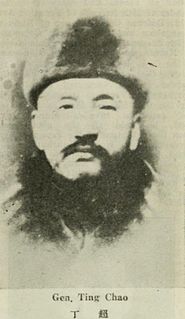 W
WDing Chao was a military general of the Republic of China, known for his defense of Harbin during the Japanese invasion of Manchuria in 1931 and 1932.
 W
WDing Jianxiu, was a politician in the early Republic of China who subsequently served in a number of Cabinet-level ministries of the Empire of Manchukuo.
 W
WNaoki Hoshino was a bureaucrat and politician who served in the Taishō and early Shōwa period Japanese government, and as an official in the Empire of Manchukuo.
 W
WAisin-Gioro Huisheng, better known simply as Huisheng or Eisei, was a Manchu-Japanese noblewoman. She was born in the Aisin Gioro clan, the imperial clan of the Qing dynasty. She was the elder daughter of Pujie, the younger brother of Puyi, the last emperor of China. Her mother was Hiro Saga, a Japanese noblewoman who married Pujie in 1937.
 W
WKanji Ishiwara was a general in the Imperial Japanese Army in World War II. He and Itagaki Seishirō were the men primarily responsible for the Mukden Incident that took place in Manchuria in 1931.
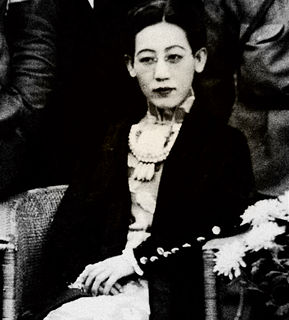 W
WYoshiko Kawashima was a Qing dynasty princess of Manchu descent. She was raised in Japan and served as a spy for the Japanese Kwantung Army and Manchukuo during the Second Sino-Japanese War. She is sometimes known in fiction under the pseudonym "Eastern Mata Hari". After the war, she was captured, tried, and executed as a traitor by the Nationalist government of the Republic of China. She was also a notable descendant of Hooge, eldest son of Hong Taiji.
 W
WNobusuke Kishi was a Japanese politician who was Prime Minister of Japan from 1957 to 1960. He is the maternal grandfather of Shinzo Abe, twice prime minister from 2006 to 2007 and 2012 to 2020.
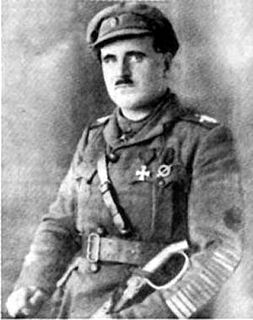 W
WVladimir Alexandrovich Kislitsin was an officer in the Imperial Russian Army and later commanding officer of the pro-monarchist White Army in the later stages of the Russian Civil War.
 W
WChū Kudō , real name Tetsusaburō Kudō , was a Japanese adventurer, Manchukuo politician and Lieutenant General in the Manchukuo Imperial Army.
 W
WMuhammed-Gabdulkhay Kurbangaliev was a Bashkir religious leader, public and political figure in the early 20th century.
 W
WLi Shaogeng, was a politician in the early Republic of China who subsequently served in a number of cabinet posts of the Empire of Manchuria.
 W
WLi Shouxin was a pro-Japanese commander in the Manchukuo Imperial Army and later the Mengjiang National Army.
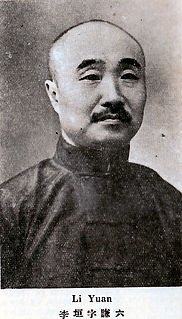 W
WLi Yuan was a politician of the Republic of China and later Manchukuo.
 W
WLi Yuqin, sometimes referred to as the "Last Imperial Concubine" (末代皇娘), was the fourth wife of China's last emperor Puyi. She married Puyi when the latter was the nominal ruler of Manchukuo, a puppet state established by the Empire of Japan during the Second Sino-Japanese War.
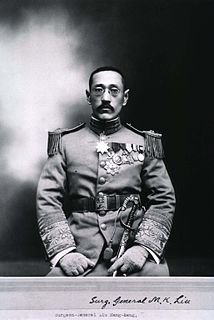 W
WLiu Menggeng was a politician and physician of the Republic of China and Manchukuo. He was born in Qinhuangdao, Hebei.
 W
WLu Ronghuan, was a politician in the early Republic of China who subsequently served in a number of Cabinet posts of the Empire of Manchukuo.
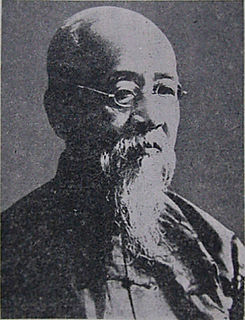 W
WLuo Zhenyu or Lo Chen-yü, courtesy name Shuyun (叔蘊), was a Chinese classical scholar, philologist, epigrapher, antiquarian and Qing loyalist.
 W
WGenrikh Samoilovich Lyushkov was an officer in the Soviet secret police and its highest-ranking defector. A high-ranking officer of the NKVD, he played a role in perpetrating Stalin's Great Purge. When, in 1938, he suspected he would soon fall victim to the purge, he fled to the Japanese. Thereafter, he acted as a major source of intelligence for Imperial Japan about the Soviet Union. At the end of World War II, he was killed by the Japanese in order to prevent him from falling back into Soviet hands.
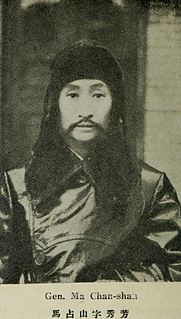 W
WMa Zhanshan (Ma Chan-shan; simplified Chinese: 马占山; traditional Chinese: 馬占山; pinyin: Mǎ Zhànshān; Wade–Giles: Ma3 Chan4-shan1; November 30, 1885 – November 29, 1950) was a Chinese general who initially opposed the Imperial Japanese Army in the invasion of Manchuria, briefly defected to Manchukuo, and then rebelled and fought against the Japanese in Manchuria and other parts of China.
 W
WYōsuke Matsuoka was a Japanese diplomat and Minister of Foreign Affairs of the Empire of Japan during the early stages of World War II. He is best known for his defiant speech at the League of Nations in February 1933, ending Japan's participation in the organization. He was also one of the architects of the Tripartite Pact and the Soviet–Japanese Neutrality Pact in the years immediately prior to the outbreak of war.
 W
WThomas Nicholas Meschery is a Russian American former professional basketball player. He was a power forward with a 10-year National Basketball Association career from 1961 to 1971. He played for the Philadelphia/San Francisco Warriors and the Seattle SuperSonics. He led the league in personal fouls in 1962 and played in the 1963 NBA All-Star Game. His jersey, number 14, was retired by the Warriors.
 W
WKonstantin Petrovich Nechaev was an Imperial Russian Army officer and White movement leader, who commanded a large Russian mercenary army in China from 1924 to 1929. Fighting for the Fengtian clique warlords Zhang Zuolin and Zhang Zongchang, Nechaev took part in several wars of the Chinese Warlord Era until his mercenary force was destroyed in the Northern Expedition. Thereafter, he mostly retired from military service and became a White émigré community leader in Manchuria. Captured by SMERSH during the Soviet invasion of Manchuria, Nechaev was executed by Soviet authorities in 1946.
 W
WShigeo Ōdachi was a bureaucrat, politician and cabinet minister in both early Shōwa period Japan and in the post-war era.
 W
WLev Pavlovich Okhotin was a member of the Supreme Council of the Russian Fascist Party, founded by exiles in Manchuria.
 W
WPujie was a Qing dynasty imperial prince of Manchu descent. He was born in the Aisin-Gioro clan, the imperial clan of the Qing dynasty. Pujie was the younger brother of Puyi, the last Emperor of China. After the fall of the Qing dynasty, Pujie went to Japan, where he was educated and married to Saga Hiro, a Japanese noblewoman. In 1937, he moved to Manchukuo, where his brother ruled as Emperor under varying degrees of Japanese control during the Second Sino-Japanese War (1937–1945). After the war ended, Pujie was captured by Soviet forces, held in Soviet prison camps for five years, and then extradited back to the People's Republic of China, where he was incarcerated for about 10 years in the Fushun War Criminals Management Centre. He was later pardoned and released from prison by the Chinese government, after which he remained in Beijing where he joined the Communist Party and served in a number of positions in the party until his death in 1994.
 W
WPuyi, courtesy name Yaozhi (曜之), was the last emperor of China as the eleventh and final Qing dynasty ruler, becoming the Xuantong Emperor at age two in 1908, but forced to abdicate on 12 February 1912 due to the Xinhai Revolution. "Xuantong", his era name, means "proclamation of unity". He later served as the ruler of the Japanese puppet state of Manchukuo during World War II.
 W
WKonstantin Vladimirovich Rodzaevsky was the leader of the Russian Fascist Party, which he led in exile from Manchuria. Rodzaevsky was also the chief editor of the RFP paper Nash Put'. After the defeat of anti-communist forces in the Russian Civil War, he and his followers fled to Japanese-controlled China. He was lured by the NKVD to return to the Soviet Union with false promises of immunity and executed after a trial in a Lubyanka prison cellar for "anti-Soviet and counter-revolutionary activities".
 W
WRuan Zhenduo, was a politician in the early Republic of China who subsequently served in a number of Cabinet-level positions in the Empire of Manchukuo.
 W
WHiro Saga was a Japanese noblewoman and memoir writer. She was the daughter of Marquis Saneto Saga and a distant relative of Emperor Shōwa. She was married in 1937 to Pujie, the younger brother of Puyi, the last monarch of the Qing dynasty of China between 1908 and 1912 and the puppet ruler of Manchukuo between 1932 and 1945. After her marriage to Pujie, she was known as, and identified herself as, Aishin Kakura Hiro (愛新覺羅•浩) or Aixin-Jueluo Hao in Chinese.
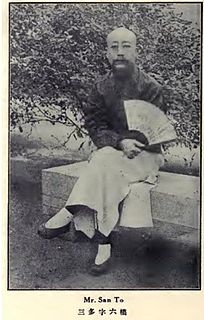 W
WSando courtesy name Liu Qiao ( 六橋) was a Qing dynasty and later Republic of China civil servant who most notably served as the 62nd and last Manchu Amban of Outer Mongolia from 1909 to 1911. Although ethnically a Mongol, Sando's aggressive implementation of Beijing ordered reforms, including increased immigration of Han Chinese to the area and a rapid buildup of a sinicized military to fend off growing Russian influence, aggravated Mongols and precipitated moves by Khalkha nobles to declare independence from China in 1911.
 W
WLieutenant General Sasaki Tōichi was a Japanese soldier who served in the Imperial Japanese Army. He was known as an expert on Chinese affairs, had close relationships with leading figures in the Kuomintang (KMT)'s National Revolutionary Army during the 1920s, and expressed sympathy for their cause. A violent encounter with KMT forces during the 1928 Jinan incident, however, led him to abandon his pro-KMT stance, and adopt a pessimistic attitude toward China. He later served as chief military advisor to the Japanese puppet state Manchukuo, and during the Second Sino-Japanese War, he was involved in perpetrating the Nanjing massacre. In the last days of the Second World War, Sasaki was captured by Soviet troops and handed over to the Chinese communists, who interned him at the Fushun War Criminals Management Centre, where he died in 1955. He was a prolific writer, and left detailed accounts of his experiences in China.
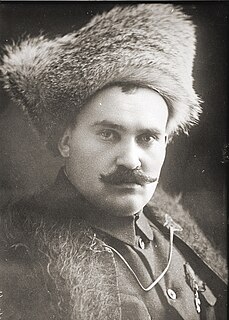 W
WGrigory Mikhaylovich Semyonov, or Semenov, was a Japanese-supported leader of the White movement in Transbaikal and beyond from December 1917 to November 1920, a lieutenant general, and the ataman of Baikal Cossacks (1919).
 W
WEtsusaburo Shiina was a career bureaucrat and politician. As Foreign Minister of Japan from 1964 to 1966 he played a pivotal role in diplomatic relations between Japan and the Republic of Korea.
 W
WSun Qichang , was a politician in the early Republic of China who subsequently served as a cabinet minister in the Empire of Manchukuo.
 W
WTan Yuling, Noble Consort Mingxian, was a concubine of China's last emperor Puyi. She married Puyi when the latter was the nominal emperor of the puppet state of Manchukuo during the Second Sino-Japanese War. Her given name "Yuling" is sometimes transliterated into English as "Jade Years".
 W
WHarumichi Tanabe was a bureaucrat and cabinet minister in early Shōwa period Japan.
 W
WWanrong, also known as Xuantong Empress of the Manchu Plain White Banner Gobulo clan, was the wife and empress consort of Puyi, the Emperor of China. She was titular Empress consort of the Qing dynasty from 1922 until abolition of the monarchy in 1924. She was also Empress consort of the Japanese puppet state of Manchukuo from 1934 until abolition of the monarchy took place in 1945. She was posthumously honoured with the title Empress Xiaokemin.
 W
WAisin-Gioro Xiqia (Aisin-Gioro Hsi-hsia; Chinese: 愛新覺羅·熙洽; pinyin: Àixīnjuéluó Xīqià; Wade–Giles: Ai4-hsin1-chüeh2-lo2 Hsi1-ch'ia4; 1883–1950), commonly known monomymously as Xi Qia or Xi Xia (Hsi Hsia; Chinese: 熙洽; pinyin: Xīqià; Wade–Giles: Hsi1-hsia4; Hepburn: Ki Kō), was a general in command of the Kirin Provincial Army of the Republic of China, who defected to the Japanese during the Invasion of Manchuria in 1931, and who subsequently served as a cabinet minister in Manchukuo.
 W
WXie Jieshi was a cabinet minister in the Japanese-dominated Empire of Manchukuo, who served as Minister of Foreign Affairs.
 W
WYu Zhishan, was a military officer under the Beiyang Government and the Fengtian clique, subsequently becoming a cabinet minister in the Empire of Manchukuo.
 W
WYuan Jinkai, was a politician in the late Qing Empire, serving subsequently under the Beiyang Government and the Fengtian clique, subsequently becoming a cabinet minister in the Empire of Manchukuo.
 W
WZang Shiyi was a Chinese general and Governor of Liaoning Province at the time of the invasion of Manchuria in 1932.
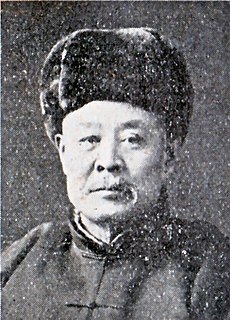 W
WZhang Haipeng (1867–1949), was a Chinese Northeastern Army general, who went over to the Japanese during the Invasion of Manchuria and became a general in the Manchukuo Imperial Army of the State of Manchuria.
 W
WZhang Jinghui ; was a Chinese general and politician during the Warlord era. He is noted for his role in the Japanese puppet regime of Manchukuo in which he served as its second and final Prime Minister.
 W
WZhang Yanqing, was a politician in the early Republic of China who subsequently collaborated with the Japanese imperialists and became the Foreign Minister of Manchukuo, Japan's puppet state. His father Zhang Zhidong was an important official in the later days of the Qing Empire, while his brother Zhang Renli was an official in the Reorganized National Government of China, another Japan's puppet state, making the two brothers as Japanese collaborators.
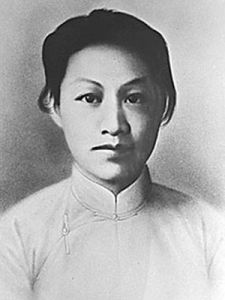 W
WZhao Yiman was a female Chinese resistance fighter against the Imperial Japanese Army in Northeast China, which was under the occupation of the Japanese puppet state Manchukuo. She was captured in 1935 by Japanese forces and executed in 1936. She is considered a national hero in China, and an eponymous biopic was made for her in 1950. The 2005 film My Mother Zhao Yiman was based on her son's memory of her.
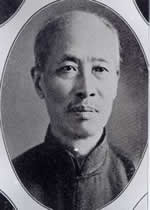 W
WZheng Xiaoxu was a Chinese statesman, diplomat and calligrapher. He served as the first Prime Minister of Manchukuo.